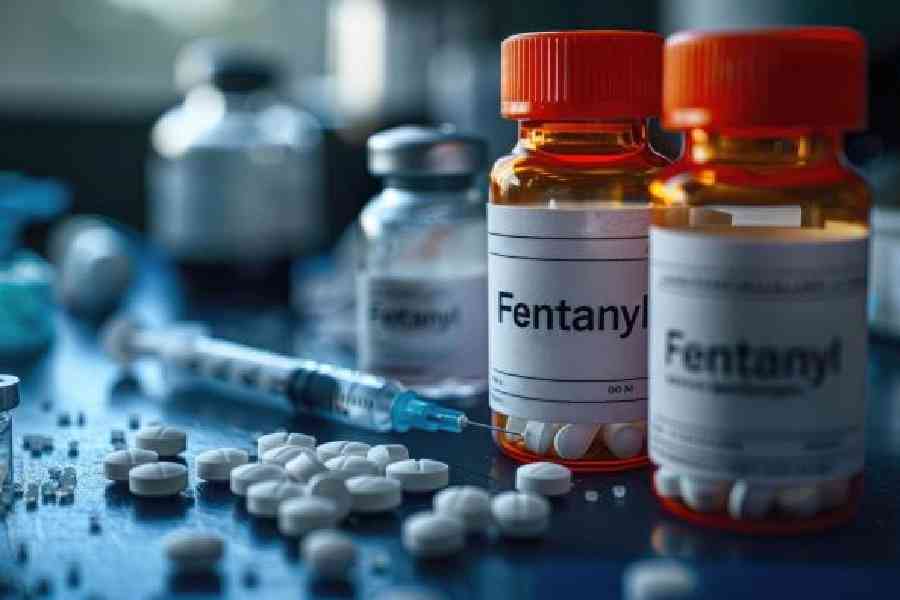The cartel recruiter slipped onto campus disguised as a janitor and then zeroed in on his target: a sophomore chemistry student.
The recruiter explained that the cartel was staffing up for a project and that he’d heard good things about the young man.
“’You’re good at what you do,’” the student recalled the recruiter saying. "'You decide if you’re interested.'"
In their quest to build fentanyl empires, Mexican criminal groups are turning to an unusual talent pool: not hit men or corrupt police officers, but chemistry students studying at Mexican universities.
People who make fentanyl in cartel labs, who are called cooks, told The New York Times that they needed workers with advanced knowledge of chemistry to help make the drug stronger and “get more people hooked”, as one cook put it.
The cartels also have a more ambitious goal: to synthesize the chemical compounds, known as precursors, that are essential to making fentanyl, freeing them from having to import those raw materials from China.
If they succeed, US officials say, it would mark a terrifying new phase in the fentanyl crisis, in which Mexican cartels have more control than ever over one of the deadliest drugs in recent history.
“It would make us the kings of Mexico,” said one chemistry student who has been cooking fentanyl for six months.
The Times interviewed seven fentanyl cooks, three chemistry students, two high-ranking operatives and a high-level recruiter. All of them work for the Sinaloa Cartel, which the US government says is largely responsible for the fentanyl pouring over the southern border.
Those affiliated with the cartel put themselves in danger just by talking to The Times and spoke on the condition of anonymity for fear of retaliation. Their accounts matched those of American Embassy officials who track cartel activities, including the role students are playing in cartel operations and how they are producing fentanyl. Times reporters spoke to a chemistry professor, who said the recruitment of his students was common.
The students said they had different jobs within the criminal group. Sometimes, they said, they run experiments to strengthen the drug or to create precursors. Other times, they say, they supervise or work alongside the cooks and assistants who produce fentanyl in bulk.
It’s unclear how widespread the recruitment of students has become, but the pursuit of trained chemists seems to have been influenced in part by the coronavirus pandemic.
A 2020 Mexican intelligence assessment, leaked by a hacker group, found that the Sinaloa Cartel appeared to be recruiting chemistry professors to develop fentanyl precursor chemicals after the pandemic slowed supply chains.
American law enforcement officials also said that many young chemists had been swept up in arrests at Mexican fentanyl labs in recent years. The arrested chemists told the authorities that they had been working on developing precursors and making the drug stronger, according to the officials.
A chemistry professor at a university in Sinaloa State said he knew that some students enrolled in chemistry classes just to become more familiar with skills needed to cook synthetic drugs. The professor, who requested anonymity for fear of reprisals, said he had identified students who fit that profile by their questions and reactions during his lectures.
Before the Sinaloa Cartel ever approaches a recruit, it scouts out its prospect.
The ideal candidate is someone who has both classroom knowledge and street smarts, a go-getter who won't blanch at the idea of producing a lethal drug and, above all, someone discreet, said one recruiter in an interview.
In months of searching, he said, he’s found three students who now work for him developing precursors. Many young people just don’t meet his standards.
About a year ago, a relative approached a first-year chemistry student with a proposal: Wouldn’t she love to make real money as a fentanyl cook?
In an interview, the student said her relative had worked for the Sinaloa Cartel for years and knew exactly what to say to lure the young woman, the eldest of five siblings. Her mother was raising the children alone, cleaning houses 12 hours a day.
The cartel offered the student $1,000 as a signing bonus, the woman said. She was terrified, but she said yes. The lab where she works is about an hour’s flight from Sinaloa’s capital, on the small aircraft the cartel uses to transport cooks to work. Her bosses told her that her job was to manufacture more powerful fentanyl, she said.
The fentanyl coming out of Mexico has often been of low purity, a problem the recruiter attributes to the desperate rush to satisfy Americans’ appetite for the synthetic opioid.
“There was such an explosion of demand that many people just wanted to earn money, and those manufacturers just made whatever without caring about quality,” the recruiter said. But in a competitive market, he said, the cartel can win over more clients with a stronger drug.
The first-year student said she had experimented with all manner of concoctions to increase fentanyl’s potency, including mixing it with animal anaesthetics. But none of her attempts at producing fentanyl precursors have worked.
“You’re starting from a blank page,” she said. “How do we create something we didn’t invent?”
New York Times News Service











